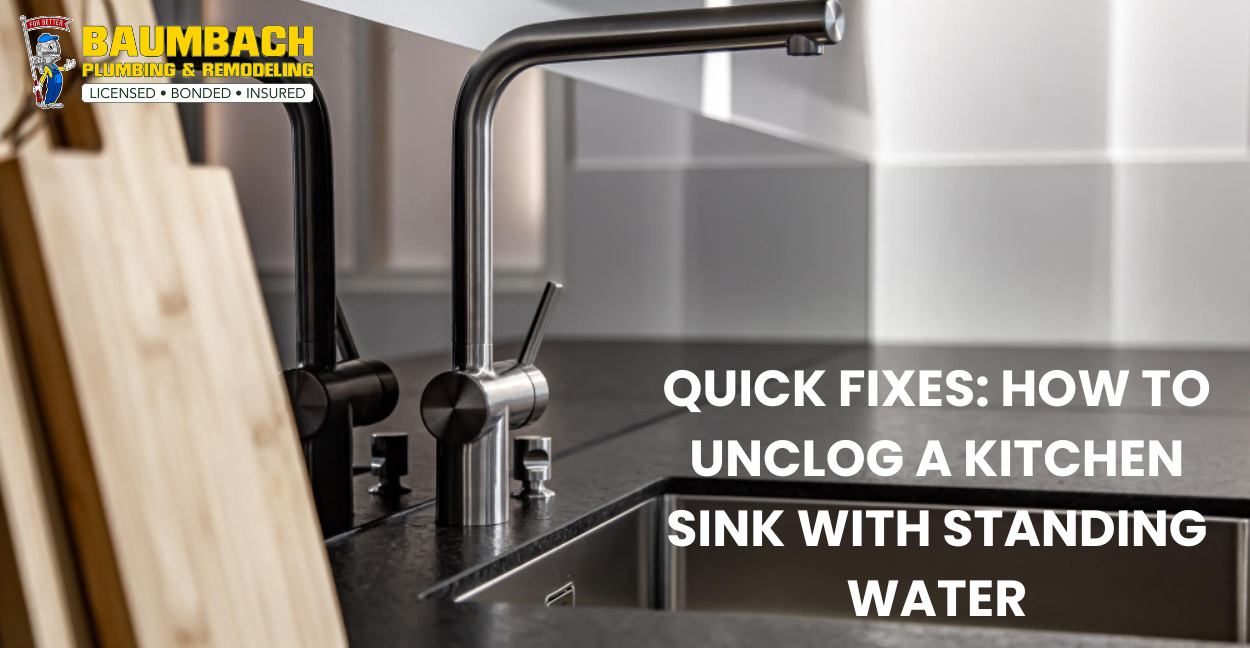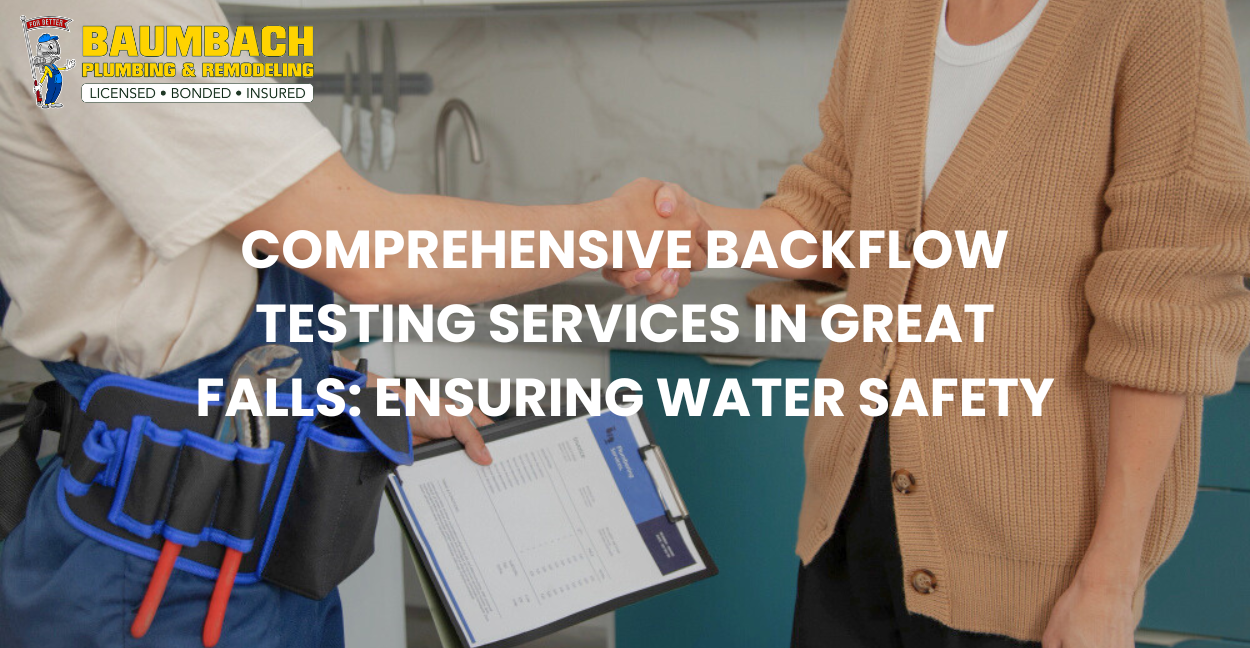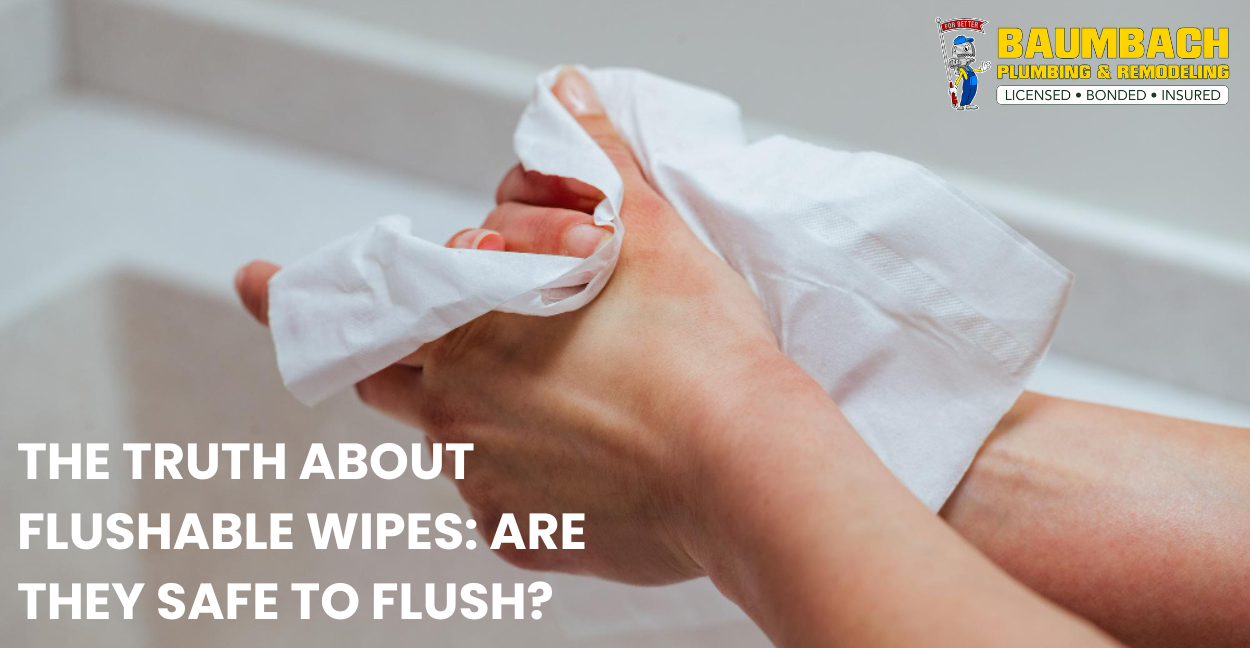A clogged kitchen sink can be a frustrating experience, especially when water starts pooling and refuses to drain. Understanding how to tackle this common household issue can save you time, money, and hassle. Here, we’ll explore reasons for kitchen sinks and effective methods to unclog a kitchen sink with standing water, from initial assessment to preventive measures.
How to Unclog a Kitchen Sink with Standing Water
Assessment of the Situation
Before diving into solutions, assess the severity of the clog. Is the water draining slowly or completely blocked? Check for visible blockages like food debris, grease buildup, or foreign objects.
1.) Use a Plunger
A plunger is a basic but effective tool for clearing sink clogs. The process involves creating pressure to dislodge the clog and allow water to flow freely. Here’s how to use a plunger:
- Fill the sink with enough water to cover the plunger’s rubber cup.
- Position the plunger over the drain, ensuring a tight seal.
- Firmly plunge up and down several times with force. The suction and pressure created can break up the clog and restore drainage.
2.) Try a Plumbing Snake or Auger
A plumbing snake or auger is a long, flexible tool designed to reach deep into drainpipes and grab onto clogs. Here’s how to use it:
- Insert the snake into the drain until you feel resistance.
- Rotate the snake clockwise while pushing forward. The snake’s coiled design helps grab onto the clog.
- Continue rotating and pushing until the snake breaks through the clog or pulls it out.
3.) Use Baking Soda and Vinegar
This natural method uses the chemical reaction between baking soda (a base) and vinegar (an acid) to break down clogs. Here’s how to use baking soda and vinegar:
- Pour half a cup of baking soda down the drain.
- Follow it with a cup of vinegar. The mixture will fizz and bubble, working its way through the clog.
- Let it sit for 15-20 minutes to allow the reaction to break down the debris.
- Flush the drain with hot water to wash away the dissolved clog.
4.) Hot Water Flush
Hot water can help dissolve grease and other substances causing minor clogs. Here’s how to do a hot water flush:
- Boil a kettle of water.
- Carefully pour the hot water down the drain in stages, allowing each pour to work through the clog.
- The heat can melt grease and loosen the clog, allowing water to flow freely.
5.) Use a Chemical Drain Cleaner (Optional)
Chemical drain cleaners are powerful but should be used as a last resort due to their harsh nature. Here’s how to use a chemical drain cleaner:
- Read and follow the manufacturer’s instructions carefully.
- Pour the recommended amount of cleaner into the drain.
- Allow it to work for the specified time, usually 15-30 minutes.
- Flush the drain with hot water to wash away the dissolved clog and cleaner residue.
These methods vary in effectiveness depending on the severity and nature of the clog. It’s essential to use caution and consider environmental and safety factors, especially when using chemical cleaners.
Effective Tips to Prevent Future Clogs in Your Plumbing System
Now we’ll discuss practical tips to avoid future clogs in your plumbing system, ensuring smooth and uninterrupted drainage.
Use Sink Strainers
Installing sink strainers in your kitchen and bathroom sinks is a simple yet effective way to catch food scraps, hair, and other debris before they enter your drain pipes. Regularly clean the strainers to prevent buildup and ensure proper functionality.
Dispose of Grease Properly
Avoid pouring grease, oil, and fatty substances down the drain. Instead, collect grease in a container and dispose of it in the trash. Grease can solidify in pipes, leading to stubborn clogs over time.
Avoid Flushing Non-Biodegradable Items
Toilet drains are not designed to handle non-biodegradable items such as paper towels, wipes, and feminine hygiene products. Dispose of these items in the trash to prevent blockages and potential sewer backups.
Schedule Regular Plumbing Maintenance
Consider scheduling annual or bi-annual plumbing inspections and maintenance checks. A professional plumber can identify and address potential issues before they escalate into major clogs or plumbing emergencies.
Use Enzyme-Based Drain Cleaners
Enzyme-based drain cleaners are a safer and environmentally friendly alternative to chemical cleaners. These cleaners use natural enzymes to break down organic matter in your pipes, reducing the risk of clogs and improving drainage.
Run Hot Water Regularly
Running hot water down your drains regularly can help prevent grease and soap buildup. Once a week, pour hot water down each drain for a few minutes to flush away residue and maintain clear pipes.
Educate Household Members
Educate everyone in your household about proper drain usage. Encourage them to avoid flushing inappropriate items down the toilet or disposing of large food scraps in the sink. Small changes in habits can make a significant difference in preventing clogs.
Address Slow Drains Promptly
If you notice slow drainage in sinks, showers, or toilets, address the issue promptly. Slow drains can indicate early signs of clogs or underlying plumbing problems. Use appropriate methods to clear the drains or consult a professional plumber for assistance.
Common Reasons for Kitchen Sink Clogs
A clogged kitchen sink can be a real nuisance, disrupting your daily routines and causing inconvenience. Understanding the common reasons behind kitchen sink clogs is crucial for preventing them and ensuring smooth drainage.
1. Food Waste Accumulation:
One of the primary culprits behind kitchen sink clogs is the accumulation of food waste. Bits of food, grease, and oil can build up over time, forming stubborn blockages in your drain pipes. To prevent this, avoid disposing of large food scraps down the sink and use a strainer to catch debris.
2. Grease and Oil Buildup:
Pouring grease and oil down the drain might seem convenient, but it can lead to serious clogs. Grease solidifies as it cools, coating the inner walls of your pipes and trapping other debris. Instead, collect grease in a separate container and dispose of it properly.
3. Soap Scum and Residue:
While soap is essential for cleaning dishes, its residue can contribute to sink clogs. Soap scum and residue can accumulate in your pipes, combining with other debris to form tough blockages. Regularly clean your sink and use enzyme-based cleaners to break down soap buildup.
4. Foreign Objects and Non-Biodegradable Items:
Accidentally dropping foreign objects or non-biodegradable items like paper towels, coffee grounds, or plastic wrappers down the sink can lead to clogs. Be mindful of what goes down your drain and dispose of such items in the trash.
5. Mineral Deposits and Hard Water:
In areas with hard water, mineral deposits can accumulate inside your pipes, narrowing the passageway for water flow. Install a water softener to reduce mineral buildup and extend the lifespan of your plumbing system.
6. Insufficient Ventilation:
Poor ventilation in your plumbing system can contribute to slow drainage and clogs. Ensure that your sink’s vent pipes are clear and functioning properly to allow air to flow and aid in drainage.
7. Aging or Damaged Pipes:
Over time, pipes can deteriorate, develop leaks, or become misaligned, increasing the risk of clogs. Regular inspections and maintenance by a professional plumber can identify and address potential issues before they escalate.
FAQs
Can I use bleach to unclog my kitchen sink?
Using bleach is not recommended for unclogging kitchen sinks. Bleach is a strong chemical that can potentially damage pipes and harm the environment. It’s best to use safer and more environmentally friendly methods like baking soda and vinegar or hot water flushes.
What should I do if plunging doesn’t work?
If plunging doesn’t work to unclog your kitchen sink, you can try using a plumbing snake. A plumbing snake is a tool designed to reach deeper into the drain and break up stubborn clogs. If you’re unsure or unable to unclog the sink yourself, it’s advisable to consult a professional plumber for assistance.
How frequently should I clean my kitchen drains?
It’s recommended to clean your kitchen drains regularly to prevent clogs. Using a mixture of hot water and vinegar once a month can help keep your drains clear of buildup and debris. This preventive maintenance routine can significantly reduce the likelihood of experiencing clogs in your kitchen sink.
Are chemical drain cleaners safe to use?
Chemical drain cleaners can be effective in unclogging sinks, but they should be used with caution. These cleaners contain strong chemicals that can be hazardous if mishandled or used incorrectly. It’s essential to follow the instructions carefully, wear protective gear, and avoid mixing different chemicals, as this can lead to dangerous reactions.
Is it possible to prevent future clogs entirely?
While it’s challenging to completely eliminate the possibility of future clogs, there are several preventive measures you can take. Avoid pouring grease or oil down the drain, use a sink strainer to catch food particles, and regularly clean your drains with hot water and vinegar. Additionally, scheduling periodic professional plumbing maintenance can help identify and address potential issues before they become major clogs.
Baumbach Plumbing & Remodeling | Professional Plumbing Services: Your Solution to Clogged Sinks
Are you dealing with a persistent clog in your kitchen sink that just won’t budge? Look no further! Contact Baumbach Plumbing & Remodeling, our team of skilled professionals specializes in resolving plumbing issues swiftly and effectively. Whether it’s a simple clog or a more complex plumbing problem, we have the expertise to handle it with precision.
Don’t let a clogged sink disrupt your daily routine. Contact us today and let us take care of it for you. Our dedicated team is ready to provide tailored solutions and expert advice to meet your plumbing needs. From unclogging drains to comprehensive plumbing services, we’re here to ensure your plumbing system runs smoothly.
Take the first step towards a hassle-free plumbing experience. Call Fairfax at 703-250-4200 or Arlington at 703-524-1250 to schedule a service or discuss your plumbing concerns. We’re committed to delivering top-notch service and ensuring your satisfaction with every job. Trust us for professional plumbing services that exceed your expectations.






